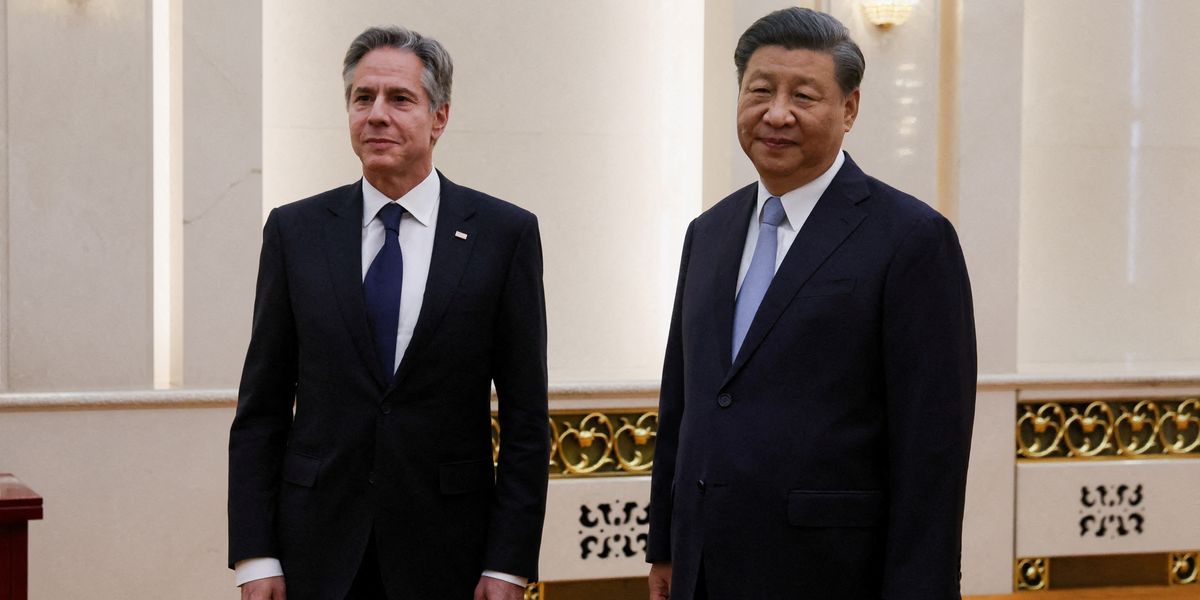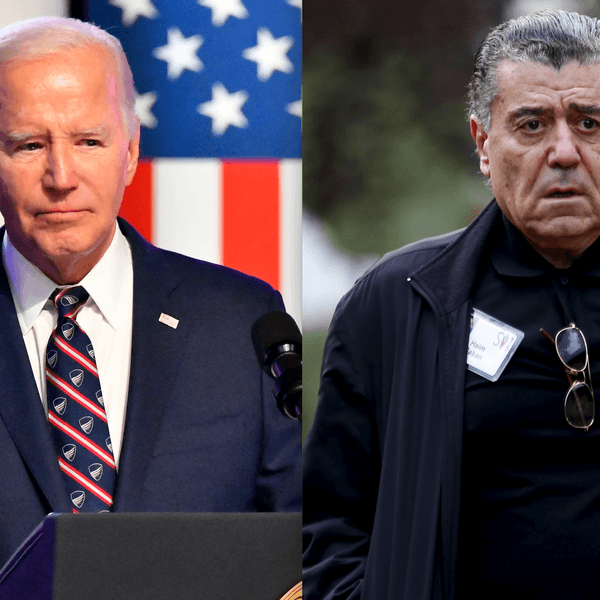Secretary of State Antony Blinken is set to travel to Beijing this week in the latest round of high-level diplomacy between the U.S. and China.
Since the U.S.–China relationship hit new lows in late 2022 and early 2023 — thanks to incidents like then-Speaker Nancy Pelosi’s visit to Taiwan and a Chinese spy balloon’s visit to U.S. airspace — both sides have made a welcome effort to slow the slide toward crisis and conflict.
This effort has focused on top leaders exchanging views through in-person meetings. Last year, Blinken, Treasury Secretary Janet Yellen, Commerce Secretary Gina Raimondo, and climate envoy John Kerry all made the trip to China. China’s top diplomat Wang Yi and top economic official He Lifeng visited the United States, culminating in President Xi Jinping’s trip to California to meet with President Joe Biden alongside the Asia Pacific Economic Cooperation summit in November. This year, a new round of exchanges began with Yellen’s trip to China several weeks ago.
All this back and forth has been accompanied by attempts from both sides to show they are mindful of some of the other’s concerns, such as U.S. reassurances on the One China Policy, which has maintained stability in the Taiwan Strait for decades, and Chinese support for U.S. restrictions on the production of fentanyl, the drug helping to drive America’s ongoing opioid crisis. Discussions between the two militaries on crisis communications are now proceeding well after years of paralysis.
Despite these promising small steps toward reviving the relationship, however, the two sides are now in danger of complacency toward the prospect of serious conflict. As the State Department signals that no new positive initiatives are on the agenda for Blinken’s visit, U.S.–China diplomacy increasingly seems devoted to talks for the sake of talks, without any ambition to make progress on the deep and powerful underlying forces driving both sides toward confrontation.
As my colleague Michael Swaine explains in a recent research brief, the appearance of stability between Washington and Beijing is likely a product of political expediency on both sides rather than a durable foundation for coexistence. Biden, facing a difficult reelection campaign against an opponent with a predilection for making conflict with China the center of every conversation, has made the wise calculation that maintaining calm around China will help him focus on his preferred themes. Xi Jinping, for his part, is preoccupied with economic difficulties, a far-reaching anti-corruption campaign in the military, and last year’s purge of several top leaders. As the wars in Ukraine and Gaza rage on, both Washington and Beijing have reason to avoid adding another international crisis to their plates.
On the one hand, these short-term considerations reflect a deeper potential for alignment. The United States and China are both status-quo powers with an interest in limited reforms to the current global system. The dynamic economies of the two countries flourish when the global system is politically stable and increasingly connected. Both countries see clear diplomatic and economic benefits to supporting the Global South’s hunger for development.
Leaders on both sides recognize the terrible threat posed by global economic instability, large-scale forced population movements, transnational crime, pandemic disease, and the climate crisis. Because existing arrangements including the domestic institutions of both countries face these dire risks, both governments are exploring promising techniques — including industrial policy, expanded development financing, and revisions to global governance issues like business taxation and the U.N. Security Council — that could chart a path out of today’s global turmoil.
Instead of joining forces and coordinating their potentially complementary efforts, leaders on both sides are seeking to reconstitute domestic unity around efforts to repel the threat posed by the other. Rather than working together on a reform agenda, the United States has been rallying its alliance network to isolate China while China has been impugning U.S. conduct to gain favor in the Global South.
Each country sees the initiatives of the other as a challenge to its own prospects rather than a potential contribution to a stable and prosperous world. This zero-sum hostility is increasingly institutionalized in all levels of government on both sides, devoting ever more resources to and establishing ever more careers on the proposition that success on the other side means suffering and failure on “our” side.
In the last month alone, U.S. officials have attacked China’s trade with Russia and prepared sanctions to punish it; blamed the problem of weak consumer demand in the global economy on Chinese “overcapacity”; added a new “minilateral” alliance network joining the United States, Japan, and the Philippines to its complement of trilateral and quadrilateral arrangements meant to hem in China militarily; and advanced legislation that now looks likely to become law that would expropriate TikTok because of its association with China.
Also in the last month, China opened a WTO dispute claiming that the Inflation Reduction Act, Biden’s signature climate and industrial policy bill, violates trade law and established rules that will eliminate Intel microprocessors and Microsoft software from Chinese government computers and servers. In a call with Biden, Xi said that U.S. restrictions on Chinese business are second only to Taiwan in the potential for inciting conflict — a notable escalation in the urgency of Chinese warnings.
This suggests the pressures to conflict continue to build. Beijing and Washington’s current mutual interest in keeping up the appearance of stability is only temporary. The fragility of the relationship leaves open the possibility that some unforeseen event could quickly push either side to change its calculus away from détente toward conflict. Even if the short-term desire on both sides to focus on domestic challenges keeps the calm for the rest of 2024, the two countries, having squandered the opportunity to move in a new direction, are at risk of entering another escalatory spiral next year.
What could Washington and Beijing do if they wanted instead to seize this opportunity and confront the problems at the root of the U.S.–China conflict? In a research report last year, I argued that they should embrace “common good diplomacy,” a new framework for a stable bilateral relationship. Through joint efforts to build an inclusive global system, the United States and China could create the basis for genuinely healthy forms of competition and cooperation by overcoming the structural pressures for zero-sum conflict, including the exclusionary system of global authority, weak and inequitable global economic growth, and the climate crisis.
The new rapprochement routine is certainly better than a march to war — but it will not do much to avert that worst-case scenario, either. A genuine attempt at mutual understanding, recognition of shared interests, and embrace of difficult negotiations is the only path to achieving security for either country.















